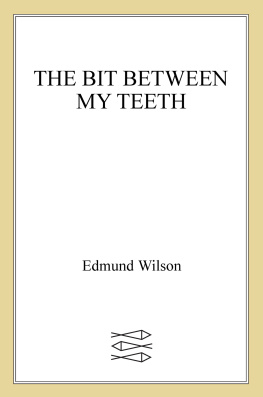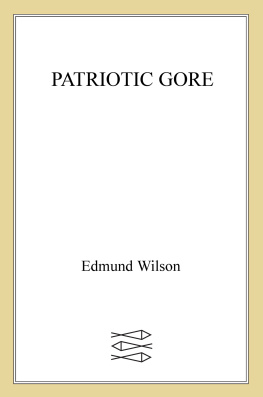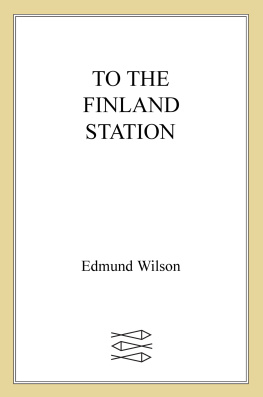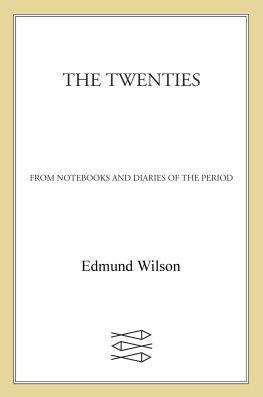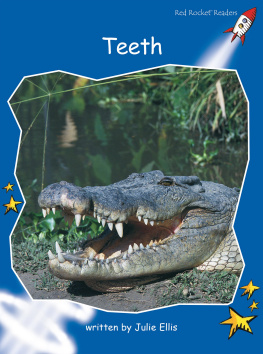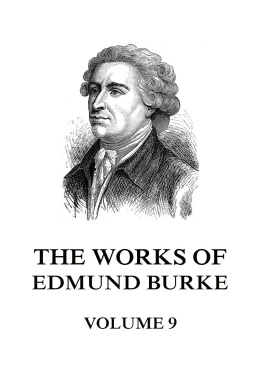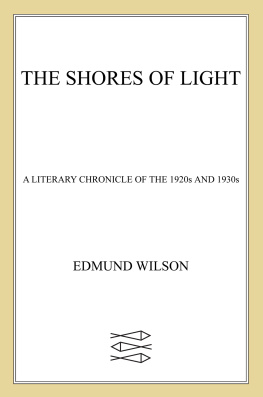Edmund Wilson - The Bit Between My Teeth
Here you can read online Edmund Wilson - The Bit Between My Teeth full text of the book (entire story) in english for free. Download pdf and epub, get meaning, cover and reviews about this ebook. year: 2018, publisher: Farrar, Straus and Giroux, genre: Detective and thriller. Description of the work, (preface) as well as reviews are available. Best literature library LitArk.com created for fans of good reading and offers a wide selection of genres:
Romance novel
Science fiction
Adventure
Detective
Science
History
Home and family
Prose
Art
Politics
Computer
Non-fiction
Religion
Business
Children
Humor
Choose a favorite category and find really read worthwhile books. Enjoy immersion in the world of imagination, feel the emotions of the characters or learn something new for yourself, make an fascinating discovery.
- Book:The Bit Between My Teeth
- Author:
- Publisher:Farrar, Straus and Giroux
- Genre:
- Year:2018
- Rating:5 / 5
- Favourites:Add to favourites
- Your mark:
- 100
- 1
- 2
- 3
- 4
- 5
The Bit Between My Teeth: summary, description and annotation
We offer to read an annotation, description, summary or preface (depends on what the author of the book "The Bit Between My Teeth" wrote himself). If you haven't found the necessary information about the book — write in the comments, we will try to find it.
The Bit Between My Teeth — read online for free the complete book (whole text) full work
Below is the text of the book, divided by pages. System saving the place of the last page read, allows you to conveniently read the book "The Bit Between My Teeth" online for free, without having to search again every time where you left off. Put a bookmark, and you can go to the page where you finished reading at any time.
Font size:
Interval:
Bookmark:

My Teeth
of 19501965
BY

The author and publisher have provided this e-book to you for your personal use only. You may not make this e-book publicly available in any way. Copyright infringement is against the law. If you believe the copy of this e-book you are reading infringes on the authors copyright, please notify the publisher at: http://us.macmillanusa.com/piracy.
A Modest Self-Tribute first appeared in the Griffin; John Peale Bishop as an introduction to a volume of Bishops prose, published by Charles Scribners Sons; The Country I Remember and The Ghost of an Anglophile in the New Republic; James Branch Cabell: 18791958, Oo, Those Awful Orcs!, Mycophile and Mycophobe, Legend and Symbol inDoctor Zhivago and Donmanship in the Nation; W. H. Auden in America, Words of Ill-Omen, A Postscript to Fowler and More Notes on Current Clichs in the New Statesman; Everyman His Own Eckermann in the New York Review of Books; and the memoir of Max Beerbohm in Encounter, which also reprinted from the Nation, Legend and Symbol in Doctor Zhivago. All the rest first appeared in The New Yorker. The Swinburne essay has been previously reprinted in The Novels of A. C. Swinburne, published by Farrar, Straus; and The Vogue of the Marquis de Sade, The Pre-Presidential T.R. and The Holmes-Laski Correspondence in a volume called Eight Essays, published by Doubleday Anchor Books.
It will be seen that a few of these articles antedate 1950. The pieces on George Ade and Trumbull Stickney and the second piece on Logan Pearsall Smith were not collected in book form earlier because I had intended to incorporate them in a work on American literature after the Civil War and through the early years of this century; but what I ended by writing was a book on the literature of the Civil War, which included a number of these later writers, so I have sprinkled these others in here.
I SUPPOSE THAT the primary key in my reading to my work as a literary critic is my finding in my fathers library, at some point when I was about fifteen, the brilliant translation by H. van Laun of Taines History of English Literature. I was fascinated by the chapters on the novelists of the eighteenth and nineteenth centuries, whom I was then in process of reading. The opening of the section on Sterne, a great favorite of mine at that time, further stimulated my interest in him: Imagine a man who sets out on a voyage equipped with a pair of spectacles that magnify things to an extraordinary degree. A hair on his hand, a spot on the tablecloth, the shifting fold of a coat, all will attract his attention; at this rate, he will not go far, he will spend his day taking six steps and will never get out of his room. And I was thrilled by the dramatic opening of the chapter on Jonathan Swift: In 1685, in the great hall of the University of Dublin, the professors who had assembled to confer bachelors degrees were confronted with a singular spectacle: a poor scholar, awkward and queer, with hard blue eyes, an orphan without friends, who depended on the charity of an uncle and had barely enough to live on, and who had already been refused his degree on account of his ignorance of logic, presented himself for a second time without having condescended to read the subject up; and the equally dramatic close of the chapter on the Restoration dramatists: In their midst, a great poet, blind and fallen on evil days, ever brooding on the miseries of the time, thus painted the tumult of the infernal orgy,with its quotation from Paradise Lost, that, so placed, acquires a new meaning; the description of the sons of Belial, flown with insolence and wine. Later on, I read Taine in French, and on one occasion, when living in New York, I became so absorbed by the coup de thtre at the end of the final chapter by which Taine evokes Alfred de Musset in order to contrast him with Tennyson and leaves Musset with the moral advantage, that I continued to read it on the street all the way to some engagement. But in the meantime, while still at school, I had thus come under the influence of French criticism, and my whole point of view about literature was affected by Taines methods of presentation and interpretation. He had created the creators themselves as characters in a larger drama of cultural and social history, and writing about literature, for me, has always meant narrative and drama as well as the discussion of comparative values. I had also an interest in the biographies of writers which soon took the bit in its teeth. This interest has not been, as is sometimes assumed, derived from the essays of Sainte-Beuve, of which I doubt if I have read a dozen, though I have undoubtedly been influenced by writerssuch as Arnold and Henry Jameswho were influenced by Sainte-Beuve, as well as by Leslie Stephen, whose Hours in a Library I read in the school library. My natural proclivity in this direction is shown by the fact that, when I got to the point of writing about Sterne at school (in the Hill School Record of April, 1911), what came out was not a critical essay but a story about Sternes last visit to London, in which I depicted him wretchedly dying, apparently as a result of his social excesses and neglected by his fashionable friends. That I was already taking account of a certain irreconcilability between the ideals of ordinary life and the special hazards of art is indicated by the final paragraph: Thus the book that made Sterne, and sent his name down through the ages, was his ruin as a man. We should never have heard of him if he had not written the book which became so popular, but if he had not become so popular, he might have continued to be the quiet, eccentric, kindly parson of York.
As for the discussion of comparative values, I did not read Matthew Arnolds essays till about 1922, when I was setting up in practice as a critic. My function in this department has, I think, been to make an effort to concentrate synoptically, as they say of the Gospels, to bring into one system, the literatures of several cultures which have not always been in close communication, which in some cases have been hardly aware of one another. There have been many examples of Englishmen who have read widely in the literature of the Continent, and several notable ones of continentals like Taine who have been well-read in English literature; but few European critics have known much about the literature of the United States, and even fewerMaurice Baring and Melchior de Vogue have been almost unique in this respecthave known anything at firsthand of Russian. For an American today it is natural to range freely in all these fields, and for anyone who wants seriously to understand the problems of the larger world with which we must now try to deal, it is important to acquire some knowledge of the literature of Marxism, that great international department of thought which, outside the Marxist movement, has, except for its influence on Bernard Shaw, till recently been hardly suspected by the general reading public of Western Europe and the United States. Now, I am far from an authority on any of these subjects, but, out of volatile curiosity and an appetite for varied entertainment, I have done some reading in all of them; and I have been working, as a practicing critic, to break down the conventional frames, to get away from the academic canons, that always tend to keep literature provincial. The educated man of the future will certainly read less intensively in any national literature, but will range over a much greater area. The courses in the worlds great books that include both the
Font size:
Interval:
Bookmark:
Similar books «The Bit Between My Teeth»
Look at similar books to The Bit Between My Teeth. We have selected literature similar in name and meaning in the hope of providing readers with more options to find new, interesting, not yet read works.
Discussion, reviews of the book The Bit Between My Teeth and just readers' own opinions. Leave your comments, write what you think about the work, its meaning or the main characters. Specify what exactly you liked and what you didn't like, and why you think so.

